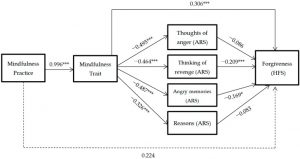Decrease Burnout in Parents During Covid-19 Lockdown with Mindfulness
By John M. de Castro, Ph.D.
“mindfulness can lower stress and anxiety, help with sleep and increase wellbeing. There are also specific benefits of mindfulness for anyone providing care to others.” – Naomi Stoll
Parenting can be difficult in the best of times but within a pandemic induced lockdown the pressures on the parents are substantially increased. Burnout can result from the continuing stress. Being mindful or engaging in mindfulness practices can be helpful in coping with the physical and psychological manifestations of stress. In addition mindfulness can help build empathy, self-compassion, patience, and flexibility that are so important for parenting, resilience to withstand the stresses, and the ability to effectively cope with the strong emotions. Indeed, Mindfulness practices has been shown to help parents cope with the physical and psychological demands of parenting.
In today’s Research News article “Self-Compassion and Rumination Type Mediate the Relation between Mindfulness and Parental Burnout.” (See summary below or view the full text of the study at: https://www.ncbi.nlm.nih.gov/pmc/articles/PMC8393602/ ) Paucsik and colleagues recruited online parents with children during the Covid-19 lockdown. They completed measures twice, separated by a month, of mindfulness practice, mindfulness, self-compassion, rumination, and parental burnout.
They found that at time 1 and 2 the higher the levels of parental mindfulness the higher the level of self-compassion and the lower the levels of burnout and rumination and the higher the levels of self-compassion the lower the levels of burnout and rumination. They further show that the higher the levels of mindfulness and self-compassion at time 1 the lower the levels of burnout at time 2 and the higher the levels of rumination at time 1 the higher the levels of burnout at time 2. Mindfulness at time 1 was found to be both directly associated with lower burnout at time 2 and also indirectly by being associated with higher self-compassion and lower ruminations at time 1 which were in turn associated with lower burnout.
These results are correlative and as such causation cannot be determined. But past research has demonstrated causal connections between mindfulness and burnout and self-compassion and burnout. So, the current results likely occurred also due to causal connections. Preventing the stress of the Covid-19 lockdown from debilitating parenting and producing burnout is highly important. The present study suggests that mindfulness and self-compassion can perform that role. This further suggests that mindfulness and self-compassion training would be helpful to parents in general and especially helpful during times of stress on the family.
So, decrease burnout in parents during Covid-19 lockdown with mindfulness.
“Practicing mindfulness is a way to focus on the present, rather than worrying about the past or the future. This is especially important when you’re spending a lot of your time in a caregiving role—you need time to relax your mind and your body.” – Karen Gagliatre
CMCS – Center for Mindfulness and Contemplative Studies
This and other Contemplative Studies posts are also available on Google+ https://plus.google.com/106784388191201299496/posts and on Twitter @MindfulResearch
Study Summary
Paucsik, M., Urbanowicz, A., Leys, C., Kotsou, I., Baeyens, C., & Shankland, R. (2021). Self-Compassion and Rumination Type Mediate the Relation between Mindfulness and Parental Burnout. International journal of environmental research and public health, 18(16), 8811. https://doi.org/10.3390/ijerph18168811
Abstract
The COVID-19 lockdown increased the day-to-day challenges faced by parents, and thereby may have increased parental burnout risk. Therefore, identifying parental burnout protection factors is essential. This study aimed to assess the protective role of the following factors which can be increased through mindfulness practice: trait mindfulness, self-compassion, and concrete vs. abstract ruminations. A total of 459 parents (Mage = 40; 98.7% female) completed self-reported questionnaires at two-time points to assess the predictive role of mindfulness on parental burnout, self-compassion and rumination type, and the mediating role of self-compassion and rumination type in the relation between mindfulness and parental burnout. Results showed that trait mindfulness, self-compassion, and rumination type at Time 1 predicted levels of parental burnout at Time 2. Self-compassion (indirect effects: b = − 22, 95% CI = [−38, −05], p < 0.01), concrete ruminations (indirect effects: b = −20, 95% CI = [−32, −09], p < 0.001), and abstract ruminations (indirect effects: b = −0.54, 95% CI = [−71, −37], p < 0.001) partially mediated the relation between trait-mindfulness and parental burnout. These findings showed that trait mindfulness, self-compassion, and concrete (vs. abstract) ruminations may help prevent parental burnout in the context of the COVID-19 pandemic. These results contribute to the field of research on parental burnout prevention and will allow for the development of effective approaches to mental health promotion in parents.









